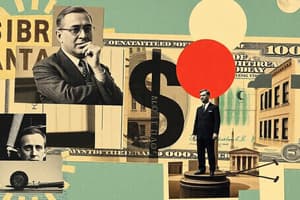Podcast
Questions and Answers
What is indicated by the horizontal axis in Figure 17-2?
What is indicated by the horizontal axis in Figure 17-2?
- The value of money
- The real interest rate
- The quantity of money (correct)
- The price level
If the money-demand curve shifts from MD1 to MD2, which event could potentially explain this shift?
If the money-demand curve shifts from MD1 to MD2, which event could potentially explain this shift?
- An increase in the value of money
- A decrease in the price level
- An increase in interest rates
- None of the above is correct (correct)
What can be inferred if the relevant money-demand curve shows an equilibrium value of money of 0.5?
What can be inferred if the relevant money-demand curve shows an equilibrium value of money of 0.5?
- One dollar purchases two baskets of goods
- One dollar purchases one-half of a basket of goods (correct)
- The price level cannot be determined
- One unit of goods sells for 0.5 dollars
If GDP is $30,000 and the velocity of money is 6, what is the quantity of money in the economy?
If GDP is $30,000 and the velocity of money is 6, what is the quantity of money in the economy?
According to the classical dichotomy, which factor is influenced by monetary supply?
According to the classical dichotomy, which factor is influenced by monetary supply?
How often does the typical dollar bill get used for transactions if the economy's real GDP is 30,000 and the money market is in equilibrium?
How often does the typical dollar bill get used for transactions if the economy's real GDP is 30,000 and the money market is in equilibrium?
Which of the following scenarios would indicate a situation of excess demand for money?
Which of the following scenarios would indicate a situation of excess demand for money?
If the equilibrium value of money is 2, what does that imply about the price level?
If the equilibrium value of money is 2, what does that imply about the price level?
According to the classical dichotomy, if the money supply doubles, which variables also double?
According to the classical dichotomy, if the money supply doubles, which variables also double?
What does monetary neutrality imply regarding an increase in the quantity of money?
What does monetary neutrality imply regarding an increase in the quantity of money?
The velocity of money is defined as?
The velocity of money is defined as?
In the quantity equation, if M = 100, V = 3, and Y = 200, what is the value of P?
In the quantity equation, if M = 100, V = 3, and Y = 200, what is the value of P?
If the money supply increases by 5 percent, what will happen to nominal and real GDP according to the quantity theory of money?
If the money supply increases by 5 percent, what will happen to nominal and real GDP according to the quantity theory of money?
If M = 5,000, P = 3, and Y = 10,000, what is the calculated velocity?
If M = 5,000, P = 3, and Y = 10,000, what is the calculated velocity?
If P = 4 and Y = 450, which of the following pairs of values is consistent?
If P = 4 and Y = 450, which of the following pairs of values is consistent?
The primary source of hyperinflations is attributed to?
The primary source of hyperinflations is attributed to?
What does money demand refer to?
What does money demand refer to?
How does money demand depend on economic variables?
How does money demand depend on economic variables?
In the context of the quantity theory of money, what happens to the value of money when the price level rises?
In the context of the quantity theory of money, what happens to the value of money when the price level rises?
Which theory describes the relationship between money supply and price level in the long run?
Which theory describes the relationship between money supply and price level in the long run?
What is a characteristic of the money supply curve when plotted with the value of money on the vertical axis?
What is a characteristic of the money supply curve when plotted with the value of money on the vertical axis?
What causes an increase in the supply of money?
What causes an increase in the supply of money?
When observing the money market, how does the money demand curve behave?
When observing the money market, how does the money demand curve behave?
What effect does a falling price level have on the value of money?
What effect does a falling price level have on the value of money?
Flashcards
Excess Supply of Money
Excess Supply of Money
Situation where the quantity of money offered in the market exceeds the quantity demanded at a given price level, usually associated with deflationary pressure.
Equilibrium Value of Money
Equilibrium Value of Money
The value of money at which the quantity of money demanded equals the quantity of money supplied, in equilibrium.
Money-Demand Curve
Money-Demand Curve
Graph that displays the relationship between the value of money and the quantity of money demanded by individuals.
Inflation Rate (2010)
Inflation Rate (2010)
Signup and view all the flashcards
Velocity of Money
Velocity of Money
Signup and view all the flashcards
Quantity of Money
Quantity of Money
Signup and view all the flashcards
Real GDP
Real GDP
Signup and view all the flashcards
Classical Dichotomy
Classical Dichotomy
Signup and view all the flashcards
Nominal Wages
Nominal Wages
Signup and view all the flashcards
Monetary Neutrality
Monetary Neutrality
Signup and view all the flashcards
Quantity Equation
Quantity Equation
Signup and view all the flashcards
Velocity Calculation
Velocity Calculation
Signup and view all the flashcards
Quantity Theory of Money
Quantity Theory of Money
Signup and view all the flashcards
Hyperinflation Causes
Hyperinflation Causes
Signup and view all the flashcards
Value of Money
Value of Money
Signup and view all the flashcards
Money Supply Curve
Money Supply Curve
Signup and view all the flashcards
Money Demand
Money Demand
Signup and view all the flashcards
Factors Affecting Money Demand
Factors Affecting Money Demand
Signup and view all the flashcards
Money Market Equilibrium
Money Market Equilibrium
Signup and view all the flashcards
Inflation
Inflation
Signup and view all the flashcards
Study Notes
Practice Questions for the Final Exam
-
Chapter 12: Inflation
- Classical theory of inflation is also known as the quantity theory of money
- Used by many modern economists to explain long-run inflation determinants
- The quantity theory of money is relied on today by most economists to explain the long run determinants of the price level and the inflation rate
- When the price level falls, the number of dollars needed to buy a representative basket of goods decreases, and the value of money rises
- When the price level rises, the value of currency falls
- Money supply curve is vertical
- Money demand depends on the price level and interest rate
-
Chapter 12: Money Market
- An increase in the money supply causes the equilibrium value of money to decrease and the equilibrium quantity of money to increase
- If money demand shifts leftward, there is initially an excess supply of money causing the price level to fall
- Money supply is vertical.
- Money market is drawn with the value of money on the vertical axis
- Money demand slopes downward
-
Chapter 17: Money Market and the Value of Money
- The quantity of money is measured along the horizontal axis of Figure 17-2
- If the money supply is MS2 and the value of money is 2, the quantity of money supplied is greater than the quantity demanded, and the price level will fall
- When the money supply shifts from MS1 to MS2, the equilibrium value of money decreases
- If the current money supply is MS1, there is an excess supply of money if the value of money is 1
-
Chapter 17: Money Supply and Money Demand
- Money supply causes the equilibrium value of money to change (increases as the money supply increases)
- In equilibrium, the quantity of money demanded equals the quantity supplied
- Shifts in the money demand curve can be caused by events like an increase in the value of money, or a decrease in the price level
- Money supply causes the equilibrium value of money to change (increases as the money supply increases)
-
Chapter 18: International Trade
- Net exports: The value of exports minus the value of imports
- Country with a trade surplus: Exports exceed Imports
- Country with a trade deficit: Imports exceed exports
- Imports and exports represent the flow of goods and services
-
Chapter 18: Net Capital Outflow
- Net capital outflow: The purchase of foreign assets by domestic residents minus the purchase of domestic assets by foreign residents
- If a country has a trade deficit: Imports greater than exports
- If a country has a trade surplus: Exports greater than imports
-
Chapter 18: Exchange Rate
- nominal exchange rate: The rate at which a person can trade the currency of one country for another
- real exchange rate: The ratio of a country's price level to the price level in another country, adjusted for exchange rates
-
Chapter 12, 17, 18, Monetary Policies
- The velocity of money is the average number of times per year a dollar is spent.
- The quantity equation MV = PY
Studying That Suits You
Use AI to generate personalized quizzes and flashcards to suit your learning preferences.
Related Documents
Description
Test your understanding of key concepts from Chapter 12, covering Inflation and the Money Market. Explore the classical theory of inflation, its long-run determinants, and how changes in the money supply affect economic equilibrium. Prepare for your final exam with targeted practice questions.



